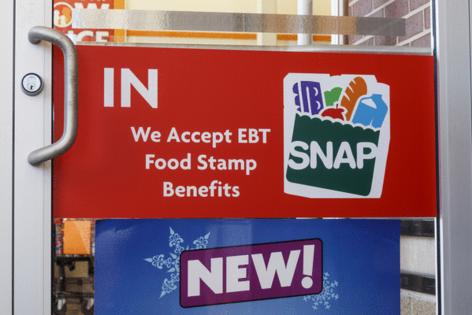USDA tells court it will disburse all SNAP contingency funds
Published in Variety Menu
WASHINGTON — The Trump administration told a federal judge Monday it will deplete what remains of a $6 billion contingency fund to pay a portion of food stamp benefits in November amid the ongoing partial federal government shutdown.
The court filings responded to an order over the weekend from Chief Judge John J. McConnell Jr. of the U.S. District Court for the District of Rhode Island directing the administration to use at least that contingency fund to provide Supplemental Nutrition Assistance Program benefits in November.
The $4.65 billion that remains in the contingency fund would cover about half of the benefits for November, according to a declaration from Patrick Penn, the deputy undersecretary for the USDA’s Food Nutrition and Consumer Services.
The DOJ said in another filing it would soon produce a “table” for states to calculate the reduced benefits available for each household, and that it would begin disbursing the funds once that table is produced.
Penn wrote it could take states “anywhere from a few weeks to up to several months” to update their systems to distribute reduced benefits.
“Given the variation among State systems, some of which are decades old, it is unclear how many States will complete the changes in an automated manner with minimal disruption versus manual overrides or computations that could lead to payment errors and significant delays,” Penn wrote.
And following the court order would leave the SNAP program vulnerable in case of future emergencies, Penn wrote.
“This means that no funds will remain for new SNAP applicants certified in November, disaster assistance, or as a cushion against the potential catastrophic consequences of shutting down SNAP entirely,” the filing said.
McConnell’s order came amid several lawsuits that argued the Trump administration violated federal law with a decision not to use the contingency and other funds to provide benefits.
Funding for food stamps has grown into the latest flashpoint in the ongoing federal government shutdown, as Trump and Republicans in control of Congress sought to blame Democrats for refusing to provide the votes to fund the federal government.
The lawsuit was brought by the Rhode Island State Council of Churches along with nonprofit groups and local governments, which sought to force the use of the contingency funds as well as other funding streams within the USDA.
The Trump administration said in the filings that the government would not move funds from other accounts and only use a contingency fund within the SNAP program to cover partial benefits for the more than 40 million Americans who receive food stamps.
WIC transfers
The administration’s filing lays out why it won’t pull from so-called Section 32 funds set aside for child nutrition programs to make up the difference.
Penn explains that the $4 billion required to supplement the partial SNAP payments would come at the expense of child nutrition programs, such as the national school breakfast and lunch programs, with no guarantee of replenishment by Congress.
Penn said in his declaration the $4 billion figure is an order of magnitude larger than the $300 million recently shifted from Section 32 child nutrition funds to alleviate a shortfall in October nutrition benefits for some 7 million low-income mothers and young children. Those benefits are funded separately under the Special Supplemental Nutrition Program for Women, Infants and Children, known as WIC.
“While USDA believes there are sufficient funds in the Child Nutrition Programs to support WIC during these unprecedented circumstances, the agency does not believe the same is true for SNAP due to the significant differences between the amounts at issue,” Penn wrote.
Penn argued that transferring additional Section 32 funds to support SNAP would “further stray from Congressional intent” and that a “much smaller transfer for WIC does not undermine performance of the Child Nutrition Programs and raises no such concerns.”
However, there’s more than just the initial $300 million WIC transfer out of Section 32 child nutrition funds. On Friday, USDA quietly shifted another $450 million to cover November WIC benefits, according to spending data posted by the Office of Management and Budget.
The National WIC Association led an Oct. 24 letter to the White House urging an additional cash infusion to avoid disruptions starting Nov. 1.
“This means that families could lose access to infant formula, breastfeeding support, nutritious foods, health care screenings, and more,” the group wrote.
States lawsuit
The Rhode Island case is separate from a similar lawsuit brought in Massachusetts by more than two dozen state governments over the freeze to SNAP benefits.
In that case, Judge Indira Talwani of the U.S. District Court for the District of Massachusetts said in a Friday order that the decision not to provide SNAP benefits violated federal law, however did not order the Trump administration to resume benefits.
Talwani gave the Trump administration until Monday to file in court about how it intended to comply with the law mandating that benefits be provided.
_____
(Olivia M. Bridges contributed to this report.)
©2025 CQ-Roll Call, Inc., All Rights Reserved. Visit cqrollcall.com. Distributed by Tribune Content Agency, LLC.










Comments